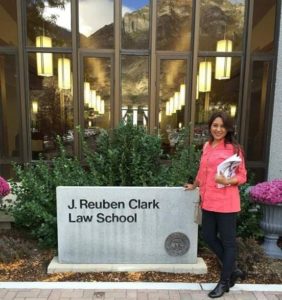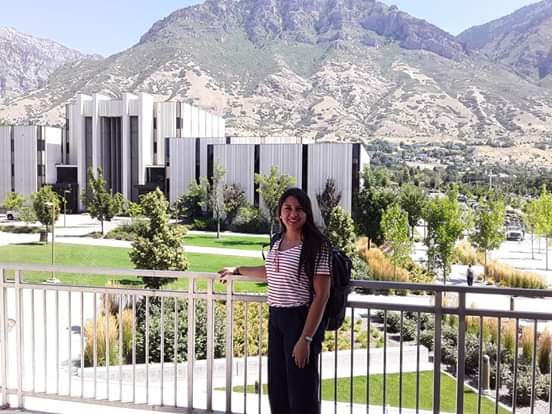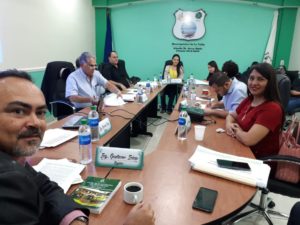Emely Perez Figueroa
LL.M. Comparative Law, 2020
Stirling Fellow, International Center for Law and Religion Studies
A 2016 trip to Utah was the start.
Emely Pérez Figueroa, a native of Honduras, remembers her curiosity leading her to inquire about the LL.M. program at the front desk at BYU Law School during a brief visit to Utah to attend General Conference in Salt Lake City.

Emely Perez Figueroa after stopping by BYU Law in 2016 to learn more about the LL.M. program.
Walking out of the law school, she took a picture with her informational materials and dreamed of one day attending.
Three years later, as she was finishing up work for her master’s degree in election law at the Universidad de Xalapa in Mexico, Emely came back to Utah to attend BYU Education Week. While in Provo, she met BYU Law Professor and LL.M. Director Eric Jensen.
Professor Jensen told Emely more about BYU Law’s LL.M. program. Emely had held onto her photo of visiting BYU Law—and her dream of attending. Hearing more about the program rekindled her interest, and just one year later, she arrived in Provo again, this time as a student.
“Sometimes with some curiosity, seemingly impossible dreams come true in unexpected ways,” she said.
Before coming to BYU, Emely had earned a law degree at Central American Technological University (UNITEC) in 2016. She also earned a Master of Election Law at the Universidad de Xalapa (UX) in 2019. She practiced family law in Honduras before becoming a city councilwoman in her hometown, La Ceiba.
 While at BYU Law, Emely has had many opportunities to learn more about religious freedom from a legal perspective. She participated in the international religious freedom clinic directed by ICLRS Associate Director David Moore. The group has been creating material to teach other countries about religious freedom rights. Currently, they are working with the Prosecutor for Human Rights in Guatemala.
While at BYU Law, Emely has had many opportunities to learn more about religious freedom from a legal perspective. She participated in the international religious freedom clinic directed by ICLRS Associate Director David Moore. The group has been creating material to teach other countries about religious freedom rights. Currently, they are working with the Prosecutor for Human Rights in Guatemala.
“Working at the clinic has been meaningful to me because our first client, Guatemala, is a fellow Central American country,” Emely said. “Being from Honduras, right next door, has taught me that religious freedom has both regional and by-country applications.”
Last fall, Emely volunteered with the Center’s International Law and Religion Symposium. The annual symposium fosters discussions about pressing global issues in law and religion. Invited delegates include religious and civic leaders, legal scholars, judiciary members, government representatives, NGOS, and members of the media.
One of the delegates to attend was Marco Midence Milla of the Ministry of the Presidency in Honduras.
He also happened to be from Emely’s hometown, La Ceiba.
“It was a really great opportunity to get together at this international level and to be able to learn from him and exchange ideas,” Emely said.
In addition to meeting high-level leaders, Emely’s experience volunteering with the Symposium introduced her to new frameworks for addressing religious freedom challenges.
“The Symposium taught me the importance of promoting human rights and religious freedom through a more far-reaching theme—human dignity,” she said.
Emely says her work with the Center has deepened her understanding of the importance of protection of freedom of religion or belief.

Emely attends a city council meeting in La Ceiba.
“Our agency—our freedom to choose—is a gift that we’ve been given,” she said. “Religious freedom is at the very essence of our freedom to choose.”
While the global pandemic has precluded formal graduation ceremonies, Emely looks forward to completing what she described as a “very intense and very challenging but very rewarding” experience at BYU Law and resuming her role as a city councilwoman.
“I’m really excited to go back home and try to share the knowledge that we received here at BYU Law School with the people of my home country,” she said.